Contact Stockwell Elastomerics
Request a quote or get more information.
Stockwell Elastomerics specializes in solving gasket and cushioning pad challenges with various silicones, a group of semi-inorganic polymers with distinct properties and diverse applications. For engineers and part designers, understanding the benefits of silicone elastomers is critical for unlocking their full potential.
Benefits of Silicone Materials for Gaskets and Pads…
Stockwell Elastomerics can do custom compression force deflection (CFD) testing on materials and products for customers. This video describes the use of the Instron Material Testing System to do in-house CFD testing.
Compression Force Deflection (CFD) Testing Video…
For customers requiring a conductive adhesive backing as an assembly aid, Stockwell Elastomerics currently offers two electrically conductive pressure sensitive adhesive options.
Read more about Conductive Pressure Sensitive Adhesives…
Thermal grease can be very messy to use for thermal management. Thermal gap filler pads provide a clean, effective alternative.
Read more about Thermal Gap Fillers Instead of Thermal Grease – Taking the Mess Out of Using Heat Transfer Products…
Outgassing or off-gassing is a phenomenon that occurs in plastics, epoxies, rubber, adhesives, and other non-metal materials. In the industrial and technology sectors, outgassing can affect the application. Stockwell Elastomerics offers low-outgassing silicone in many forms (foam, sponge, and solid) and fast turn sampling for testing/validation.
Read more about Elastomer Outgassing and Its Importance…
Stockwell Elastomerics’ engineering team investigates the Z-axis conductivity of material and conductive adhesive combinations.
Read more about Electrically Conductive Adhesives…
For customers requiring a conductive adhesive backing as an assembly aid, Stockwell Elastomerics currently offers two electrically conductive pressure sensitive adhesive options.
Read more about Conductive Pressure Sensitive Adhesives…
Stockwell Elastomerics developed its T62 conductive surface coating process, resulting in a line of closed cell silicone sponge products with conductive coating for ESD protection, and provides the details for its 3 standard products.
Read more about Silicone Sponge Gaskets and Pads with Conductive Coating for ESD Protection…
Stockwell Elastomerics has developed the capability to laminate acrylic adhesive onto ultra thin silicone rubber to manufacture ultra-thin gaskets.
Read more about Ultra-Thin Silicone Rubber with Adhesive Backing for Gaskets and Seals…
Compression set resistance and stress relaxation affect material selection. This technical discussion shows why silicone is often a good material choice for gaskets, seals and pads.
Read more about Compression Set Resistance and Stress Relaxation…
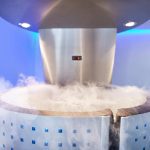
Methyl-vinyl silicone (VMQ) is an excellent low-temperature elastomer, capable of staying flexible at temperatures as low as -100F. This makes it a go-to gasket and cushioning material for extreme environments.
Read more about Methyl Phenyl Silicone / Ultra Low Temp Silicone Gaskets…
![]()
Learn about the differences between solid silicone, silicone sponge and silicone foam in this silicone selection guide.
Read more in the Silicone Sponge, Silicone Foam, Solid Silicone – Selection Guide…
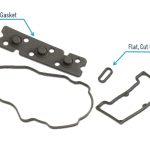
Stockwell Elastomerics has recently added two new EMI gasket materials: SNAF-572, a nickel-coated aluminum particle filled fluorosilicone and SNA-568, a nickel-coated aluminum particle filled silicone.
Read more about Nickel-Aluminum Silicone (SNA-568) and Fluorosilicone (SNAF-572)…
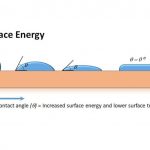
See the update to a previous blog post about applying adhesives to silicone elastomers. Stockwell Elastomerics has proprietary expertise in applying acrylic adhesive onto silicone materials, including silicone foam, silicone sponge, and solid silicone, along with fluorosilicone.
Read more about the Update – Applying Adhesives to Silicone…
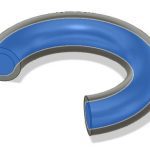
See the top 5 reasons for seal failures, including tips to diagnose the failure, explain why it happened, and how to fix it.
Read more about Static Seal Failure Modes…
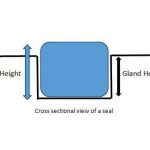
Designing an effective seal is important for many applications like environmental seals that need to prevent water ingress in variety of wetness and temperature conditions. 3 key considerations for designing a good seal: Cross sectional “squeeze”, gland fill, and material selection.
Read more about Seal Design – 3 Considerations…
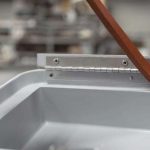
Stockwell Elastomerics’ video demonstration of silicone gasket tape shows adhesive-backed silicone sponge and silicone foam gasketing being applied to an enclosure. This video shows the difference between open cell silicone foam (BF-1000), closed cell silicone foam (HT-800) and closed cell silicone sponge and how they are used to make gasket tape. Additional information about gasket tape and custom gasket strips is also available.
See more about the Gasket Tape Video Demo…

The design of EMI gaskets can be a difficult challenge for electrical and mechanical engineers when trying to protect an enclosure from both environmental and electrical ingress. Four major topics to consider when searching for a solution are described. Additional information about EMI gaskets is available.
Read more about EMI Gasket Design…
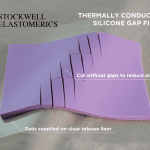
Stockwell Elastomerics’ digital flash cutter can kiss cut thermal gap filler pads from .020” to .250” thick against a protective release liner. ThermaCool® TC2006 and ThermaCool® TC3008 thermally conductive gap filler materials are often used.
Read more about Thermal Gap Filler Pads with Release Liners…
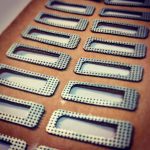
Electrically conductive foams such as Condux Plus™ can be used to solve design challenges in electronic assemblies for electrical shielding and grounding issues. Stockwell Elastomerics now provides Condux Plus™ in cut to size fabricated gaskets and pads with low production quantities and quick-turn deliveries.
Read more about Electrically Conductive Gap Filling Foam…

Stockwell Elastomerics shows a video demonstration of the advantage of using Stockwell Elastomerics’ 12PT easy release liners and demonstrates how to remove pressure sensitive adhesive liners from soft foam materials. Additional information about easy peeling liners for silicone foam gaskets and PORON foam with adhesive is also available.
See more about Foam Gasket Release Liners…

Stockwell Elastomerics provides a video of a vertical burn test (UL 94V-0) using HT-800 flame rated silicone foam, a high temperature foam material that resists burning so it can be used for turnout gear. Additional information about turnout gear and silicone foam is also available.
See more about Turnout Gear Foam Padding and the Vertical Burn Test…

Stockwell Elastomerics provides a video demonstration of how thermal gap pads work. Additional information about custom thermal gap filler pads, thermally conductive pads, and thermal interface pads is also available.
See more about Thermal Gap Filler Pads and Heat Tranfer…

Stockwell Elastomerics provides a video demonstration and describes how pre-formed silicone o-rings are better than off-the-shelf standard o-rings. Additional information about custom silicone o-rings and sealsis also available.
See more about Pre-Formed Silicone O-Rings…

Stockwell Elastomerics provides a detailed technical discussion of expanded rubber and closed cell rubber, including expanded silicone, neoprene and urethane (PORON). Additional information about closed cell sponge rubber is available.
Read more about Expanded Rubber and Closed Cell Rubber…

Stockwell Elastomerics shows an example burn test for flame propagation per ASTM C 1166 on HT-800 silicone foam. Additional information is available on the web page about silicone foam..
Read more about ASTM C 1166 Flame Propagation Test on HT-800 Silicone Foam…

Stockwell Elastomerics provides a detailed technical discussion of gasket design and provides design tips.
Read more about Custom Gasket Design Tips…

Stockwell Elastomerics can utilize UL flame-rated adhesives to manufacturer gaskets, including 3M 9375W and other pressure sensitive adhesives. Additional information about adhesives is also available.
Read more about UL Flame Rated Adhesive for Gaskets and Pads…

Stockwell Elastomerics provides a detailed technical discussion of the ASTM D6576 specification and its effect on gasket design. Additional information about closed cell silicone sponge is available.
Read more about ASTM D6576 and Closed Cell Silicone Sponge…

Stockwell Elastomerics manufactures EMI flange faskets that meet MIL-DTL-83528/4 specifications. Additional information is available on the web page about EMI Gaskets.
Read more about MIL-DTL-83528/4 EMI Flange Gaskets…

Stockwell Elastomerics has long been a supplier of green heat conductive rubber, heat press pads and film. Additional information is available at the web page on Heat Press Pads, Heat Press Film.
Read more about Green Heat Conductive Rubber Pads…

Stockwell Elastomerics provides a detailed technical discussion of the top of compression set – the measurement of how much a material does not rebound – and why this is important. Additional information is available at the web page on Compression Set of Elastomeric Materials.
Read more about What is Foam Compression Set?…

Stockwell Elastomerics often utilizes soft silicone rubber for applications requiring a high level of sealing against dust and water ingress as prescribed by IP67 requirements. These may include submerged gaskets and ruggedized equipment.
Read more about Soft Silicone Rubber for Sealing to IP67 and IP68…

Stockwell Elastomerics provides a two part series of posts on the Elastomerics Blog about custom EMI gaskets. Part 1 is about combination EMI gaskets, including sponge and wire mesh. Part 2 focuses on particle filled, conductive rubber EMI gaskets. Read more…
Part 1 – Combination EMI Gaskets, Sponge and Wire Mesh
Part 2 – Particle Filled, Conductive Rubber EMI Gaskets
![]()
Stockwell Elastomerics now offers silicone foam and silicone sponge as insulation backers to the flexible heater / silicone rubber heater markets. These high temperature foam backings help improve heater efficiency by reducing heat loss. Heater foam insulation from Stockwell Elastomerics may be permanently bonded with silicone RTV or tacked in place with DP-1001 peel and stick backing.
Read more about Insulation for Silicone Rubber Heaters and Flexible Heaters…

EMI management is a must for OEMs manufacturing electronic devices or equipment containing electronics. EMI gaskets made from rubber material such as silicone and fluorosilicone lose some physical strength due to the conductive particle fill. This is most apparent in tensile strength in thin EMI gasket materials. Stockwell Elastomerics now offers components manufactured from SNE-556-R conductive silicone EMI gasket material with a conductive reinforcement.
Read more about EMI Gasket Material with Conductive Reinforcement…

Information on how to select between closed cell (for water sealing gaskets) and open cell foams (for dust and light spray gaskets). A video demonstrates these two materials in action.
Read more about Open Cell Foam vs. Closed Cell Foam…

Stockwell Elastomerics supplies dovetail gaskets, automated UV bonded gaskets, jointed gaskets, and gasket tape for large gasket applications or electrical enclosures.
Read more about Automated Dovetail Gaskets and Other Bonded Gaskets…

A new case study illustrates how Stockwell Elastomerics partners with OEM engineers to resolve challenging design problems with a focus on manfacturability. Highlighted in this case study is a project where a leading LED lighting manufacturer was having trouble passing an IP-67 submersion test with their standard gasket.
Read more about Custom LED Gasket Design – Case Study…
![]()
Stockwell Elastomerics believes that customers should be able to select a product just the way they like it – in this case, silicone rubber with or without talc. Silicone rubber is often manufactured with a light application of talcum powder to prevent the rubber from sticking to itself. In some cases, customers the light powder coating is not wanted. Or talc free silicone may be needed to increase the coefficient of friction, ensure chemical purity and cleanliness. Stockwell Elastomerics offers select varieties of silicone rubber manufactured without talc or with talc.
Read more about Silicone Rubber Surface Conditions – With Talc or Without Talc…
![]()
Stockwell Elastomerics offers closed cell silicone sponge and silicone foamgaskets that range in firmnesses from very soft to extra firm. Cellular gasket materials may not be suitable for some applications such as IP67, NEMA 6 and NEMA 6P (water submersion). An alternative to soft cellular gasket material is molded low durometer silicone, but in some cases even a soft (10 durometer or 20 durometer) compound is still too firm. One approach to lowering compressive forces is to use a shape factor.
Read more about Soft Silicone Gasket via Shape Factor…
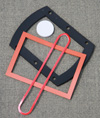
Gasket materials range from metals, fibers, composites and elastomerics. Within each of these categories there are tens or hundreds of variations. A few examples of elastomeric materials are silicone, chloroprene (Neoprene), EPDM, urethane, and fluoroelastomers (fluorocarbon and fluorosilicone). Within each polymer group there are physical variations such as expanded sponges and foams, solids, thermally conductive and electrically conductive. Stockwell Elastomerics has a core competence in commercially available, high performance, elastomeric materials and regularly assists customer with gasket material selection.
Read more about Gasket Material Selection…

Stockwell Elastomerics inventories a selection of acrylic and silicone pressure sensitive adhesives. 3M 9731 is a unique specialty adhesive that combines both adhesive families. This double coated adhesive (also called film supported adhesive) uses .0016” thick premium acrylic (350 series) adhesive on one side of a .001” PET film and .0029” thick silicone adhesive on the opposite side of the PET. The total adhesive thickness is .0055” without release liners.
Read more about 3M 9731…

A common technical question is about the Rubber Manufacturers Association (RMA) tolerance table and what “Fixed” and “Closure” dimensions are. A way to think of this is a clam-shell mold (top and bottom halves). Stockwell Elastomerics does liquid injection molding (LIM) with liquid silicone rubber (LSR) and does rubber compression molding with specialty silicone rubber materials
. Read more about RMA fixed dimensions and RMA closure dimensions …

What are compression set, stress relaxation and creep in relation to elastomeric gasketing? All these items are related but different measurements of stress/strain and deformation and all are affected by temperature. Check out a brief overview of compression set, stress relaxation and creep, and how they relate to commercially available gasketing materials.
Read more about compression set, stress relaxation and creep …

While indoor LED lighting and LCD displays are on opposite sides of the spectrum, they often share a common problem – light leaking. Light leaking may not be in the official industry terminology, but it adequately describes the problem of light emitting from an enclosure or housing where it is not intended. Ambient lighting fixtures, such as fluorescent, LED, or incandescent have areas or joints where the designer wants to contain the light – or prevent a light leak.. This can be addressed with lightweight foam materials to create a light leak gasket.
Read more about light leak gaskets …

Like most gasket designs, performance can be linked to the type of material and how it relates to a specific application – this holds true for touch panel gaskets. There are environmental considerations, gasket geometry, manufacturability and industry specifications. A video highlights a PORON gasket with a double coated, repositionable adhesive which gives the soft gasket X and Y axis dimensional stability to help with installation.
View the video and read more about touchscreen gaskets …

Stockwell Elastomerics offers many pressure sensitive adhesive backingoptions for gaskets. Standard adhesive such as 3M 467, Adchem 256M and 3M 9485 work very well for bonding to metals, plastic and glass, however some applications require the ability to remove or reposition the gasket during installation. Other applications may need non-destructive reworking after being in the field for some period of time. These type of applications may benefit from a repositionable adhesive.
View the video and read more about adhesive backed repositionable gaskets …

A common element of ruggedizing portable electronic devices is holding the battery in place as well as protecting it from a mechanical shock event, such as a drop to concrete. Often, there are small gaps left between the battery and the compartment cover, this gap allows movement and impact that can damaged the battery or disconnect power. Designers of ruggedized devices commonly use PORON cushioning pads to fill the gap between the battery and cover.
Read more about battery compartment pads and cushions …

Electrically conductive gaskets and gasket materials are typically specified for EMI applications. Commercial EMI applications often call for nickel graphite filled silicone due to cost, whereas military and aerospace applications often call for silver coated aluminum to meet MIL-DTL-83528 specifications. Military or aerospace may also use fluorosilicone vs. silicone for its fuel and chemical resistance.
View the video and read more about electrically conductive rubber and EMI gasket materials …

The obvious part of gasket design is picking a material that meets functional requirements such as water or dust sealing. However a significant component of the design process that less obvious includes selecting materials that meet specifications, such as MIL, IP, NEMA or UL. Underwriters Laboratories is the leader in safety testing, the two most common requirements which relate to gaskets are UL 94 (UL94) and UL 50 (UL50). Stockwell Elastomerics maintains an extensive on-site inventory of a wide range of materials that are UL recognized for one or many UL requirements including: UL 94, UL 50, UL 50E, UL 508, UL 157, UL 1570, UL 1571, UL 1572.
Read more about UL listed gasket materials and UL rated gaskets …

Gasket Tape, also called Strip Gaskets, Slit to Width Gaskets, Foam Tapes or Strip-N-Stick® (Registered Trade Mark of Saint Gobain) are all names for sponges or foams that have a peel and stick adhesive backing which are then cut to a prescribed width. Stockwell Elastomerics has extensive experience in gasketing and sealing applications and has hand picked the best performing materials for strip door gaskets, enclosure gaskets, NEMA gaskets and IP gaskets.
Read more about strip gaskets, gasket tape, and sponge/foam gasketing tapes …

Touch screen displays have been in use for many years but are more prevalent now in many handheld devices. Each touch screen application, while similar in function, requires different gasket protection due to their varying designs for in-use environments. Indoor consumer touch screens more often just require dust gaskets with some mechanical shock protection. Outdoor LCD touch screen displays require a higher level of gasket protection, as do industrial control displays.
Read more about LCD display and touch screen gaskets …

Gasket performance hinges on the integrity of the gasket material over its life expectancy. Two significant elements that can be detrimental to gasket life and integrity are ultraviolet (UV) light and ozone. Silicone rubber is a top performer in battling degradation, with excellent UV and ozone resistance. Since silicone rubber is inorganic it does not have the carbon backbone in its polymer structure that makes the organic polymers prone to being attacked by UV and ozone.
Read more about UV and ozone resistant gaskets …

There are many variables in designing a gasket. The Gasket Design Guide article in Machine Design (November, 2010 issue) written by Stockwell Elastomerics’ Application Engineer Steve Hughes speaks to some of the key elements of gasket design. The article touches on functional considerations, material selection, mechanical factors and manufacturability.
Read more about the Gasket Design Guide article …

Light Emitting Diode (LED) lighting technology has been around for a long time, but with more recent advances (e.g. high power LEDs), new lighting products are serving commercial and municipal markets. Low energy consumption and long service life are primary benefits for LED city lighting and area lighting for parking lots and walk-ways.
Read more about gaskets for LED lighting and similar applications …
![]()
Silicone rubber is more often being specified for gasket material, especially environmental seals. Silicone is made in wide variety forms such as solid silicone sheets, closed cell silicone sponge sheets and open cell silicone foam. All of these are available in a range of durometers and firmnesses.
Read more about silicone rubber gaskets and their technical properties …
![]()
Stockwell Elastomerics launched a new product – Stockwell DP-1001. This silicone pressure sensitive adhesive (PSA) with easy to remove release liner can be used with die cut silicone gaskets and cushioning pads, greatly reducing the time required to remove the release liner. It also performs well in high temperature applications. As part of this new product launch, Stockwell Elastomerics is new offering a DP-1001 product sample pack so that customers can see and touch the product to experience firsthand its benefits.
Read more about Stockwell DP-1001 …
View the Stockwell DP-1001 product demo video …

Stockwell Elastomerics has been working with a major Wind Turbine Blade manufacturer on a design and logistics challenge – how to hold and transport fragile wind turbine blades that are 110 feet long and greater – without squeezing the blade too firmly.
Read more about this transportation cushioning pad special application …

Saint-Gobain’s R10400M flame retardant silicone sponge is a unique expanded silicone sheet product. It has similar mechanical properties as standard silicone sponge rubber but with flame resistance, R10400 holds an aggressive UL 94V-0 flame rating.
Read more about R10400M flame retardant silicone sponge …
View R10400M burn test video …

SE65 is a carbon filled electrically conductive silicone rubber, durometer of 65 Shore A scale, typically used to dissipate or ground out static while providing some compliance and cushion. SE65 can be bonded to a conductive surface (aluminum or steel) using Stockwell Elastomerics’ RTV60-CON which is also a carbon filled silicone based RTV (Room Temperature Vulcanizing), making a very intimate and strong bond when the surfaces are prepared properly.
Read more about conductive pads, ESD pads, and conductive adhesives under cryogenic exposure, view video …

Gasket Tape, Strip Gaskets and Strip-N-Stick™ are common names for a strip of gasket material with peel and stick adhesive backing. Strip gaskets are good for dust and light pressure water seals such as NEMA3, IP61, IP62.
Read more about gasket tape and strip gaskets …

Formex GK polypropylene sheet has been engineered to meet electronic equipment requirements. Over the last few years Stockwell Elastomerics has been laminating Formex to other UL 94 rated materials such as HT-800 and BF-1000 silicone foams.
Read more about Formex thin UL rated polypropylene sheet …

Stockwell Elastomerics uses steel rule dies to cut PORON urethane foam, silicone foam, silicone sponge, and neoprene sponge. It is important to know that softer and thicker foam or sponges tend to have wider tolerances because the material compresses before it is cut through. Solid silicone gaskets, thermal gasket, EMI gaskets can also be cut with steel rule dies.
Read more about steel ruled die for custom gasket cutting …

Whether you are designing a pad or gasket it is important to know how the environment will affect your part. Excessive heat can be linked to many gasket failures in the form of compression set.
Read more about the general operating temperatures for commonly used materials…
![]()
Stockwell Elastomerics has a dedicated production cell for assembly where silicone foam, silicone sponge, urethane foam and EMI materials are bonded, lamininated and/or assembled.
Read more about silicone foam waterjet cutting and foam assembly…
![]()
Addition or platinum cured silicone offers an increasingly popular alternative to conventional peroxide cure silicone products – especially for healthcare applications which require the utmost purity and cleanliness of materials.
Read more about Platinum Cured Silicone compared to Peroxide Cured Silicone…

Stockwell Elastomerics often receives urgent calls requesting next day gaskets or pads. Many times there is field requirement or engineering build where time is critical. Stockwell inventories a wide range of materials and thicknesses and has many production capabilities to allow for quick responses to urgent requests.
Read more about helpful hints for fast gaskets to fix a problem or meet a deadline…
![]()
Stockwell Elastomerics joins silicone sheet regularly for large silicone gasketsthat exceed standard silicone sheet manufacturing widths.
Read more about jointed silicone gaskets…

Stockwell Elastomerics offers UV corner bonding for large gaskets. This process includes die cutting or water jet cutting the gasket “legs” with a dovetail type joint at the ends. The jointed ends are then bonded with a UV sensitive adhesive.
Read more about large gasket splicing…

Stockwell Elastomerics provides custom EMI gaskets regularly for a wide range of customers. Each application is a bit different; some can be cut from “off the shelf” sheets of nickel graphite filled silicone and others may require special fluorosilicone compounds or silver plated particle filled silicone for more conductivity.
Read more about EMI gaskets…

An example of a gasket compression calculation using the Compression Force Deflection Curve for an HT-800 silicone pad.
Read more about Gasket Compression Percentage Calculation…
![]()
Is Silicone PSA required for silicone material? Stockwell Elastomerics often sees silicone based adhesive specified with silicone materials. Silicone adhesives are expensive as compared to acrylic adhesives, in some cases more than 5 times the cost of acrylics. Silicone PSA’s bond strength is not as good as acrylics and there are limited offerings. So why are silicone adhesives being specified?
Read more about acrylic adhesive backed silicone gaskets…

There is a new breed of personal computers on the market today, the Ultra Mobile PC or UMPC. Stockwell Elastomerics has been ruggedizing electronicsfor many years. The key to achieving a truly rugged component is in the materials. For example, if a device is exposed to extreme low temperature and dropped it will rely on the cushioning pad for protection.
Read more about ruggedizing UMPC components…
![]()
Stockwell Elastomerics engineers have seen more requirements for silicone foam and closed cell silicone sponge enclosure gaskets and cushioning pads requiring high strength pressure sensitive acrylic adhesives for bonding to powder coated metal surfaces and certain low surface energy plastics. Secure lamination of acrylic pressure sensitive adhesives onto silicone rubber is not possible without priming the silicone rubber.
Read more about high performance acrylic adhesives on silicone …

It is interesting how the word “rubber”, which historically has referred to natural rubber (also known as isoprene), has become a general term for elastomeric materials. Natural rubber is the original elastomer but there have been many more synthetic polymers developed, each with its own unique property.
Read more about rubber gaskets, rubber seals, rubber pads …

For decades Stockwell Elastomerics has been applying pressure sensitive adhesive backings onto gasketing materials. Adhesive backed gaskets are very appealing to customers for several reasons. More often engineers and designers are specifying adhesive backings for gaskets. A peel and stick gasket (or peel and stick vibration pad) offers some nice features that plain or non-adhesive backed gaskets don’t have.
Read more about adhesive backed gaskets …

What if you need a large custom gasket? In some cases they are extreme such as the one shown. In many cases they are gaskets for NEMA enclosures, (commonly NEMA 4). A single piece gasket generally offers the best seal, however many gaskets exceed the width of the material. In this case a jointed corner may be an option.
Read more about large custom gaskets …
![]()
Stockwell Elastomerics carries a wide range of silicone materials to meet the demands of most applications. Over the years silicone has grown to be the core product. More and more engineers are specifying silicone products into their design because of its unique properties. Today Stockwell Elastomerics stocks silicone sheet materials and compounds for custom molded silicone parts.
Read more about silicone gaskets and materials …

Kiss cutting is a die cutting process where a gasket or pad is supplied rolled up on the adhesive liner. If you were able to watch the cutting process in slow motion you would see the die penetrate the gasket or pad material, then continue through the thin adhesive layer and cut partially into the adhesive liner. The kiss cut gasket or pad must have a pressure sensitive adhesive (PSA or “peel and stick”) backing for kiss-cutting to be possible.
Read more about kiss cut gaskets and pads …

Supported adhesives, also called double coated tapes, get their name from their construction. A thin plastic like layer (typically PET) is coated on both sides with a thin layers of adhesive. The most common family of pressure sensitive adhesives (PSAs) are acrylic based. Adhesive manufacturers such as 3M, Adchem, and Saint-Gobain offer many varieties of adhesives with different bond strengths, temperature ranges, and mechanical properties.
Read more about supported PSA …
Although we usually think of silicone rubber as being pigmented red, black, or gray in color, silicone rubber is also available in clear, transparent sheets and as custom molded parts. Using Stockwell Elastomerics’ liquid injection molding (LIM) capability, clear components can be molded in durometers from 10 to 70 Shore A. For flat gaskets Stockwell Elastomerics suggests HT-6240, a clear, high purity, 40 durometer silicone rubber
Read more about clear / transparent silicone rubber …
![]()
Stockwell Elastomerics’ 3 waterjet units are able to cut complex geometries with ease. A steel ruled tool or solid steel tool would be relatively expensive and still would not offer tolerances equal to the waterjet cut gaskets and parts.
Read more about waterjet cut gaskets …
EPDM (Ethylene, Propylene, Diene, Methylene) is commonly specified for outdoor gasketing applications. This is due to EPDM’s excellent weather ability, and specifically its resistance to UV, ozone and oxidation. The closed cell structure minimizes water absorption which makes it a good material for enclosure gaskets needing occasional resistance to moisture and indirect water spray. EPDM sponges are available in various firmnesses from very soft to firm. EPDM gaskets are not recommended where they may come in contact petroleum based oils and certain chemicals.
Read more about sponge EPDM gaskets …

Stockwell Elastomerics has a proprietary coating process to make custom electrically conductive silicone pads for ESD protection. The conductive pads are available in various thickness, firmnesses and geometries. The coated silicone sponge allows for a wide temperature range without loosing physical performance. The coating creates a conductive path on the surface of the material, parts can be partially or entirely coated to best suit the application.
Read more about electrically conductive coated pads …
Thermally conductive gap pads or gap filler pads provided for electronic thermal management have nearly always been fabricated from silicone rubber-based materials. Stockwell Elastomerics is continuing to evolve from a rubber fabricating company to a materials technology company. It’s all about the materials.
Read more about thermally conductive fluorosilicone …

“Enclosure gasket” is a broad term that basically describes the gasket between a housing and a cover or door on the housing. The configuration and function of the enclosure can vary drastically, from metal to plastic, large to small, dustproof to waterproof , etc. NEMA and IEC International Protection (IP) standards help engineers define the specific requirements that need to be met for their design.
Read more about NEMA enclosure gaskets …
![]()
Confused about the terms silicone foam versus silicone sponge. Closed cell silicone sponge is heat cured from a mixed silicone gum rubber base. Open Cell and Closed Cell Silicone Foam is cast from low viscosity liquid silicone which is catalyzed, rapidly mixed and cast onto a smooth plastic release liner.
Read more about silicone foam and silicone sponge …
When is silicone the best choice? One of the key elements of silicone is its ability to maintain its mechanical properties over a wide range of temperature, -80° F – 400° F (60° C – 205° C) and in some case even colder or hotter. Silicone is also naturally UV resistant which makes it ideal for outdoor applications. There are silicone foams that are UL 94V-0 rated which is commonly required in the transit and electronic sectors. It also performs well in compression set tests as compared to some of the organic elastomers, such as neoprene.
Read more about silicone gaskets …

Sometimes we are asked to make parts wider than available stock widths or lenghts. In some cases, in an effort to meet customers’ needs, we will join materials. Most commonly jointed materials are silicones (solids, sponges or foams). Parts are generally section cut into “sub-pieces” then jointed, an alternate method is to join the materials then cut to size (if it will fit on the cutting bed).
Read more about material jointing …

Stockwell frequently does material laminations. In some cases we laminate standard sheet goods to create a non-standard thickness. In other cases we laminate materials for performance properties.
Read more about material laminations …
Stockwell Elastomerics has a new film supported silicone pressure sensitive adhesive for silicone rubber gasketing. We teamed up with a specialty adhesive manufacturer to develop our new DP1001-2HT, which has 2 mils of silicone polymer adhesive on both sides of an amber colored polyimide film carrier.
Read more about silicone pressure sensitive adhesives …
![]()
We have a number of gasket applications for R10490-M closed cell fluorosilicone sponge that are used in very harsh environments. These conditions include exposure to engine oil, hydraulic fluid, Coolanol, PAO and jet fuel over broad temperatures and outdoor conditions. The aircraft and aerospace industries have been the largest users of R10490-M to date.
Read more about R10490-M fluorosilicone sponge …

By any measure designing and drawing cushioning pads and gaskets is simple, but specifying the correct material is a whole different game. There are literally thousands of “soft good” material variations to choose from. Determining the best one for a customer’s applications is the real challenge. It’s all about the materials!
Read more about materials and selection …
The European Union has adopted a directive called Restrictions on Hazardous Substances (RoHS). It eliminates or significantly reduces the use of certain substances from electronics products beginning July 1, 2006. Although Lead (Pb) seems to get most of the attention, other substances included in the directive are Cadmium (Cd), Mercury (Hg), Hexavalent Chromium (Cr VI), Polybrominated Biphenyl Ethers (PBBs) and Polybrominated BiPhenyl (PBDEs).
Read more about RoHS compliance …

Check out this fast-turn project that involved a 17 foot long gasket. The requested material was .062″ thick closed cell silicone sponge rubber with acrylic adhesive completely coating one side and a 1.0″ wide strip of acrylic adhesive on the top side. As the 41″ width exceeded the 36″ typical material width, we realized splices would be needed.
Read more about large radome gasket prototyping …
If you have additional questions or to request further assistance, please Contact us.